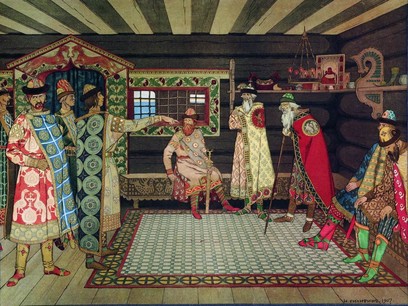Ural Federal University Students Develop Game Immersing Players in the Medieval History of Slavs
Young scientists of the Ural Institute of Humanities and students of the Engineering School of Information Technologies, Telecommunications and Control Systems have developed and launched a historical educational game “The Man of Medieval Rus in the Abyss of Partition: in the Service of the Knyaz and the Motherland”. The quest is dedicated to the 12th-13th centuries of Russian history and reflects the period of political fragmentation. The game was created with the support of the History of the Fatherland Foundation and the Russian Historical Society.
“At the beginning of the 12th century, Medieval Rus was the largest state formation on the European continent. The disintegration of it is conventionally dated to the year of the death (1132) of Mstislav the Great, son of Vladimir Monomakh. The 12 lands: Kyiv, Pereyaslavl, Chernihiv, Volhynia, Galitsa, Smolensk, Suzdal, Novgorod, Polotsk, Ryazan, Murom, and Pinsk received an independent role. Although the royal dynasty, faith, historical and ethnic self-determination remained united, the era of appanage fragmentation became a time of new challenges and alternatives, including for an individual,” says Alexey Popovich, co-author of the development, Junior Researcher of the Laboratory of Primary Sources Research of the Ural Federal University.
According to the developers, the task of the game’s participants is to survive in the harsh world of appanage fragmentation and, with the help of allies, try to achieve for their ruler the power in any principality by defeating the enemies and restoring the honor of the clan. In addition to questions, the game contains a dictionary with descriptions of Medieval Rus everyday objects, customs, and biographical and encyclopedic references.
“We offer students and everyone who is interested in the history of Russia of the 12th-13th centuries to try themselves in the role of a young man-at-arms Vasilko, whose personal decisions determine both his personal fate and the position of his knyaz. On this path, the hero can both stumble and become a powerful boyar,” adds Sergey Ryabov, a research assistant at the UrFU Laboratory of Primary Sources Research.
In the course of the quest, the user will visit the main appanage Russian principalities, foreign states (Byzantium, Hungary, Poland), and the lands of the Cuman khans. Decisions will help players make encyclopedic references, illustrative material, dictionary definitions, and quotes from monuments of Old Russian literature. According to the developers of the game, the information will help to make a complete picture of that time and feel like a man of ancient Russia.

